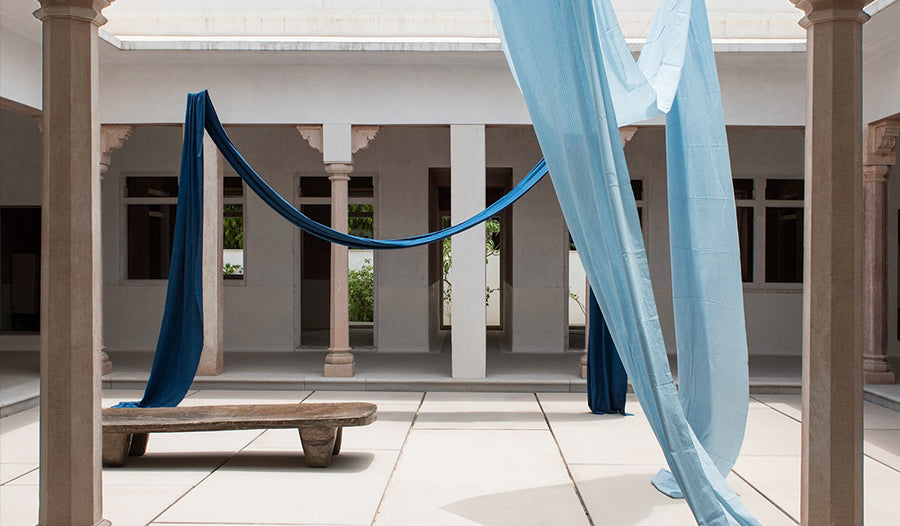
BLUE SKY THINKING

In the heart of the Pink City there is a house named in honour of blue.
Nila House (nila meaning blue in Hindi) refers to India’s oldest natural dye, indigo. Founded in 2019 by Carole Bamford (perhaps best known as the founder of Daylesford Organics), Nila is part of the Lady Bamford Foundation - a charitable initiative of JCB (more often associated with yellow) - which works with communities around Jaipur and Udaipur, to encourage sustainable production and enhance business efficiency in artisan workshops, with a particular focus on natural dyes and handloom textiles.

Nila stemmed from Bamford’s passion for Indian textiles, combined with the desire to make a positive environmental commitment in the country that she fell in love with forty years ago, and where today, waste water from the synthetic dying process has contaminated many rivers.
A sustainable crop, indigo was once grown widely across India, producing shades of blue ranging from from inky-almost-black to summersky-blue. For the dyers, it is safe to handle, which is just as well as the process can be long. It involves fermenting the leaves of indigo plants, but the fabric does not turn blue in the vat. Exposure to oxygen is required. A drying piece of dyed fabric will slowly turn from yellow to green, to a deep dark blue. The length of time the fabric spends submerged does not dictate the richness of the colour, so the fermenting, dying and drying needs great skill. Too much fermentation, or not enough, or the wrong level of heat can destroy a whole batch of dye.

With the complexity and time-consuming nature of the dying process, unsurprisingly the use of natural indigo dye went into free-fall once a German chemist Adolf von Baeyer was able to synthesise the colour in 1897 (a process for which he was given the Nobel prize). Within a decade, synthetic blue dye devastated the Indian indigo growing industry, and today most indigo dye in India is synthetic. The indigo that gives most denim its signature blue involves extracting petroleum from the earth, as well a host of chemicals, including cyanide and formaldehyde. It is not difficult to understand the huge human and environmental impact that this change in the dying process has had on a textile producing country such as India.
It is in this context that Nila House has been created, to be almost a Bauhaus for natural dye and handloom traditions in India. A place where art, craft, intellectualism and a practical hands-on attitude are combined. The centre is housed in a heritage bungalow dating back to the 1940s which is constructed in traditional haveli style around a central courtyard. Once a family home, the property was in disrepair before it became a home for Nila. Despite the condition of the building, traces of Jaipur’s distinct early-20th century modernism, as well as the simplicity of the open plan layout, showed the potential for it to be the perfect setting for Nila’s forward-thinking approach towards preserving tradition.

Nila's research and grassroots work on indigo naturally extended to the crafts of hand weaving and natural dyes, further branching into other crafts of the hand such as hand spinning, hand weaving and embroidery. Nila aims to slowly reintroduce chemical-free, decentralised systems back into the supply chain and to this end, Nila works with communities of farmers and artisans by providing consistent support to grow livelihood capabilities. Nila also works closely with her sister organisation LBCT, to create craft-focused vocational training programmes that feed back into Nila's collections as hand-finishing or hand-crafted detailing by the women.
Extract from the article Blue Sky Thinking: Nila House, Jaipur, written by Laura Gray and featured in Issue 93 Rethink.

We're delighted that Nila House will be hosting a workshop on hand-spinning for Selvedge on 2 & 3 July 2022.
Hand-spinning is a skill that is both soul-nourishing and practical. Learning how to spin your own natural fibre yarn and then create beautiful textile or embroidery pieces with it is a wonderful way to truly appreciate the magic of handmade textiles.
The two-part workshop has been designed by Nila House as a comprehensive introduction to the craft of hand spinning. The workshop will give participants a foundational knowledge that get your started on your journey with hand-spinning.
Find out more about the workshop here:

